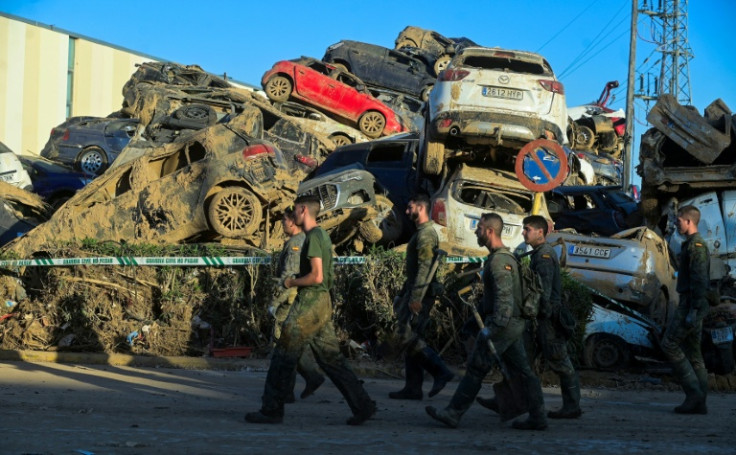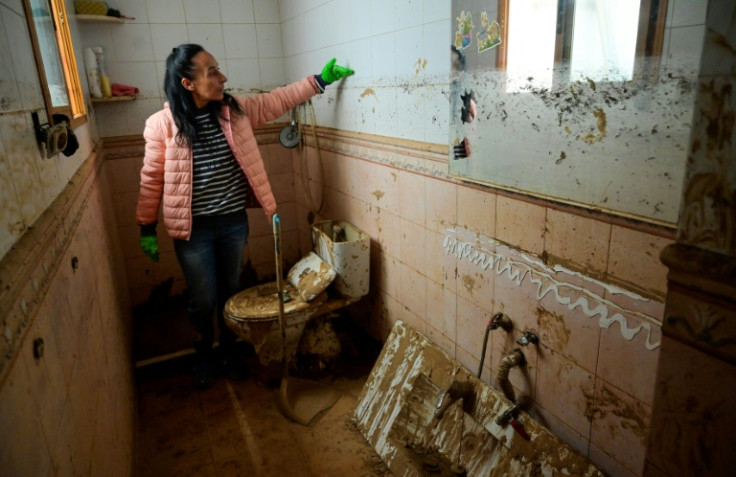
Angry residents called for fresh protests in Spain on Friday as the country marked one month since its worst floods in a generation killed 230 people.
Outrage swept the country after the October 29 catastrophe tossed cars, wrecked infrastructure and destroyed homes and businesses, particularly in the eastern Valencia region.
Telephone alerts reached some residents when water was already raging through towns, while several municipalities went for days without state help and relied on volunteers for food, water and cleaning equipment.
The authorities' handling of the disaster prompted trade unions and associations to call for rallies in the hardest-hit areas later on Friday.
Another protest is expected in Spain's third city Valencia on Saturday. A first demonstration on November 9 drew 130,000 furious citizens demanding the resignation of regional leader Carlos Mazon.
"What is demanded of us is that we are efficient and arrive as soon as possible... that is the people's main complaint," Mazon, who has hung onto his post, told reporters on Friday.
"We have to be extraordinarily understanding with the protests... there are still lots of people who have received nothing, so we cannot rest," he added, announcing the reopening of Valencia's metro on December 3.
Popular outrage boiled over in the ground-zero town of Paiporta on November 3 when survivors hurled mud at King Felipe VI, Queen Letizia, Prime Minister Pedro Sanchez and Mazon.
Sanchez and Mazon were escorted away and their fleeting unity has since collapsed, with the left-wing central government and the conservative regional administration trading blame for the handling of the floods.
Thousands of troops, police, firefighters and volunteers continue to clear debris, repair damage and extract mud from garages, basements and car parks in the traumatised Valencia region.
Two piles of rusting vehicles greet visitors to the town of Catarroja, where garages are still caked with mud and the council declared three days of mourning for the victims.
"They have supported us a lot, but one month on many of the streets are a mess, the parks are still destroyed," said 44-year-old Gyovana Gimenez, whose restaurant was gutted by floodwater.
Spain's Economy Minister Carlos Cuerpo on Thursday reeled off a dizzying list of damaged property according to insurance data, including 69,000 homes, 125,000 vehicles and 12,500 businesses.
The government has scrambled to put together aid packages collectively worth 16.6 billion euros ($17.5 billion) in grants and loans to help stricken citizens piece back together their shattered lives.
But Amparo Peris expressed the despair of many in the flood epicentre who feel "abandoned" by politicians of all stripes.
"We thank the volunteers, but we are very tired because this is not moving forward," the 35-year-old domestic assistant told AFP in Catarroja.
"This is horrific... I feel powerless because they (the authorities) do nothing," added pensioner Fina Solaz, 69, as she queued to collect essential goods.
Lourdes Real, a 46-year-old hairdresser, said her three daughters were still not back in school and there is still a lot of mud to remove.
"We still have a lot of work to do. In the first basement of the garage, the mud is up to our ankles," she told AFP as she cleaned the patio of her building.









